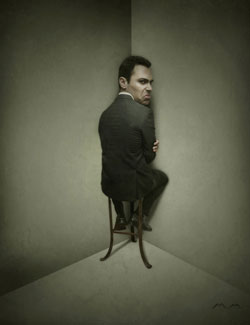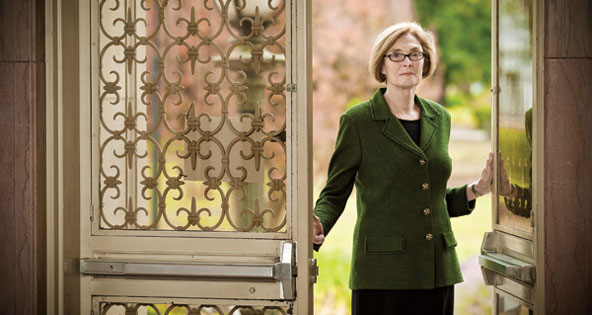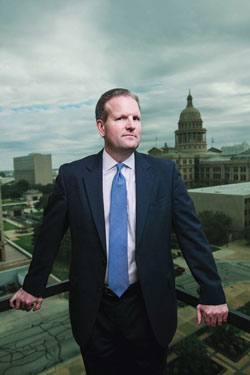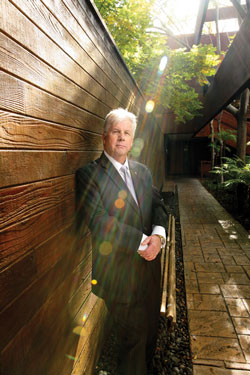You're Out of Order! Dealing with the Costs of Incivility in the Legal Profession

Illustration by Matt Mahurin
William Gary White III was accused of being so uncivil and unprofessional that the South Carolina Supreme Court suspended him in 2011 for 90 days and ordered him to complete the state bar’s legal ethics and professionalism program.
White was found to have violated a slew of South Carolina’s ethics rules in a letter to his client, an Atlantic Beach, S.C., church that had received a town notice that it needed to comply with zoning laws. White’s letter, copied to the town manager and later made part of the published opinion, was a scorcher:
“You have been sent a letter by purported Town Manager Kenneth McIver. The letter is false. You notice McIver has no order. He also has no brains, and it is questionable if he has a soul. Christ was crucified some 2,000 years ago. The church is His body on Earth. The pagans at Atlantic Beach want to crucify His body here on Earth yet again. …
“First-graders know about freedom of religion. The pagans of Atlantic Beach think they are above God and the federal law. They do not seem to be able to learn. People like them in S.C. tried to defy federal law before with similar lack of success.”
A town council member filed the disciplinary complaint that led to White’s suspension. In its opinion, the state supreme court held that White ran roughshod over an oath it implemented in 2003 mandating that lawyers act with “fairness, integrity and civility, not only in court, but also in all written and oral communications.”
White says he’s learned from the experience. He says his client told him to make the comments in the letter and at the time believed them to be political statements regarding a religious matter. “I thought it was free speech,” he explains. “I think the rules are clearer now; I didn’t consider it a breach of ethics before that. I considered it representing a client.”
South Carolina is just the latest in a string of states formally demanding their lawyers treat others with respect. But it’s been only recently that the state’s highest court has punished lawyers solely for uncivil acts, as it did with White. “Until two years ago, we didn’t have any public opinions or sanctions simply on civility,” says Lesley M. Coggiola, disciplinary counsel for the Supreme Court of South Carolina. “There might have been problems with communication, diligence and any number of other issues, and the court would say, ‘By the way, we’ll cite the oath as well.’ We now have four or five opinions that are strictly on civility, including three in one year and one for a lawyer hitting an opponent in a deposition.”
The South Carolina court may just be warming up. “We take this opportunity to address what we see as a growing problem among the bar, namely the manner in which attorneys treat one another in oral and written communication,” it said in a 2011 opinion. “We are concerned with the increasing complaints of incivility in the bar.”

Lesley Coggiola: “The Supreme Court of South Carolina has issued “four or five opinions that are strictly on civility, including three in one year and one for a lawyer hitting an opponent in a deposition.” Photo by Stan Kaady.
MULTILATERAL APPROACH
It’s impossible to say whether incivility in law is escalating or there’s simply more grousing about it. But the profession’s leaders are calling out what they say is a troubling lack of civility, and states like South Carolina are cracking down. However, the most effective tools for erasing incivility in the profession may be the judges and lawyers willing to tamp down uncivil behavior the moment it emerges.
Coggiola’s agency doesn’t track complaints about incivility, nor do other states. And even anecdotally, some aren’t discerning a spike. “We haven’t seen it here,” says Wallace E. “Gene” Shipp Jr., bar counsel at the District of Columbia Bar. “We’re not receiving complaints about that sort of thing.”
However, there is unmistakably more talk about a troubling growth in incivility. “My speech to the opening assembly at the 2011 ABA Annual Meeting was all about civility,” then-President Stephen N. Zack recalls. “At the same meeting, former Supreme Court Justice Sandra Day O’Connor, Justice Stephen G. Breyer and the chief justice of Canada’s highest court all talked about civility. We didn’t plan it, but we all ended up on the same page.”
Lawyers posit a range of theories on where and against whom incivility is most often directed. Some believe it’s more prevalent in large cities. Others say they’ve seen entirely too much directed at young female associates, often to gain a tactical advantage. Yet the more important question may be why incivility may be becoming the norm. Lawyers blame incivility on:
• Over-the-top portrayals of lawyers on TV and in films.
• Inexperienced lawyers and a lack of mentoring.
• The fuzzy line between aggressive advocacy and rudeness.
• The broad platform provided by today’s technology, coupled with the ability to act anonymously online.
• The country’s current, fractious public discourse.
By far, technology is cited most often as the foundation for boorish behavior. Coggiola says she feels old saying it, but she attributes a good deal of the problem to the ability of the everyday jerk lawyer to broadcast views online. “We’ve had some serious issues, and they’re all related to social media,” she explains. “Our court has already spoken on the First Amendment—you give some of that up when you become a lawyer. But we’re really struggling with a case sitting at the court right now. A lawyer is blogging, and it’s just vile, insulting everybody from Hispanics to women to ‘midgets.’ It’s horrible.”
Because South Carolina’s civility oath applies only to opposing parties and counsel, Coggiola’s office has asked the court to sanction the lawyer for bringing the profession into disrepute. The argument? If he were personally blogging or posting the comments on Facebook, without identifying that he’s a lawyer, the bar couldn’t touch him. “However, if you say you’re a lawyer, and if there’s a nexus between you being a lawyer and what you’re posting, then we’re going to come back to this rule and find it a ground for discipline,” contends Coggiola. “We need the court to come out and say this is not OK.”
A close second and third place behind technology are just-licensed lawyers who perhaps watch too many rogue lawyers on TV and in movies. The labor market has forced many to hang their own shingles without the mentoring they’d have through a traditional employer. “Young lawyers are hungry for information on the proper balance between advocacy and civility,” says Jonathan Smaby, executive director for the Texas Center for Legal Ethics in Austin. “They get mixed messages from law school and the media, which portrays lawyers in movies, television and fiction—and sometimes in real life—as much more cutthroat and cutting corners than really goes on.
“They want to do the right thing,” he says, “but don’t know what the right thing is.”

Jonathan Smaby: “Young lawyers are hungry for information on the proper balance between advocacy and civility. …They want to do the right thing, but don’t know what the right thing is.” Photo by Josh Huskin.
FIGHTING BACK
Lawyers aren’t just complaining about incivility. They’re fighting back—civilly, of course.
Bar organizations and disciplinary bodies are flooding the zone with training. Florida’s Orange County Bar has reached out to local law schools to provide more professionalism education to students. A recent topic, according to James Edwards—a shareholder at Zimmerman, Kiser & Sutcliffe in Orlando, who’s headed his state and local bar’s professionalism committees—covered the interplay between professionalism and civility on one hand and technology and social media on the other. Coggiola and her staff are also providing more frequent opportunities for civility education. “One thing we do in this office is speak [to legal audiences] all the time,” she says. “I’ve made it very clear that if somebody wants us, we’re there—and we always cover civility. I often say it baffles me that we had to change the oath to tell people to be nice to each other. But clearly the court thought it was necessary.”
Other state courts have also felt obligated to formalize a civility requirement. Florida is among the latest, revising its oath of admission to include a duty of civility in 2011, citing the American Board of Trial Advocates’ similar inclusion. Also in 2011, the ABA’s policymaking House of Delegates endorsed a renewed commitment to civility. And in 2012, ABOTA published an online Civility Matters tool kit to provide ideas and direction for sessions teaching civility. Courts are also more often sanctioning egregious behavior. But that requires lawyers and judges to report louts, which can still be a roadblock. “I don’t think people are often willing to report,” Coggiola says. “They like to complain about other lawyers, but they don’t want their name on it. We also speak to judges and tell them that if they see this behavior, they’ve got to report it.”
First, however, judges have to know the basics of civility themselves, something that can be disputed. In March 2010, the Plain Dealer in Cleveland reported that Cuyahoga County Common Pleas Court Judge Shirley Strickland Saffold used her office computer to comment on cases before her under the online username “lawmiss.” A later search revealed comments attacking Arabs, Asians and white men on at least 10 other websites using that name. Saffold denied making comments about any cases before her, while her daughter admitted to making some under the lawmiss moniker.
“Judge Saffold has always recognized the fine line between civility and enforcing decorum in the courtroom,” says her lawyer, Brian Spitz of South Euclid, Ohio. Saffold and her daughter sued and later settled with the company that administers the newspaper’s website over the release of their names to reporters, according to the Plain Dealer.
The best judges set an example and rein in bad behavior before it becomes the norm. “My father was a judge for 20 years, and he was very strict,” Edwards says. “People frequently tell me they were afraid of him because he required absolute adherence to the rules and politeness, and if you didn’t do right you were in trouble.”
That’s the opposite of what Calvin House, a partner at Gutierrez, Preciado & House in Pasadena, Calif., recently saw in court. While waiting for a case to be called, House witnessed a lengthy argument between a lawyer and a judge that included the lawyer accusing the judge of violating a bankruptcy stay. “It was a very heated discussion throughout, and to accuse a judge of basically committing a criminal act—which violating a bankruptcy stay is—was pretty extreme,” says House. “That comment the judge sort of rolled with. Eventually he got visibly angry and said, ‘We’re done!’ But that was after, I’d say, 30 minutes of interchange.”
House was not only taken aback at how personal and persistent the lawyer’s behavior toward the judge became; but also astounded at how long the judge tolerated the lawyer’s rant. “One thing that’s surprised me is the amount judges will sometimes put up with before they get to that point,” House says. “I get it. From their standpoint, if they’re harsh early on, they run the risk of not getting information they need and not appearing fair. But that’s part of the problem. There were probably three other cases besides mine while this was going on, so four sets of attorneys were observing what happened. That lawyer got a $4,000 reduction in what his client had to pay. So someone just learning the business might get the message that this is the way to represent your client.”
A judge in that situation risks losing credibility with lawyers and lay observers, neither of which is good for the administration of justice. “I think judges get involved in exchanges with attorneys more often than they did 10 years ago,” adds House. “With that exchange, the judge seemed to feel the need to justify his position. I don’t understand why he didn’t say, ‘Look, I’ve made my ruling. If you believe I’m wrong, you’ll need to appeal. Let’s move on.’ Where that’s done, it can be effective, and it doesn’t have to be done in a vehement or rude way.”
Edwards says most judges he appears before do just that. Most, but not all: “One told me—and I was sad to hear it—that if you’re too tough on people, you’re going to draw an opponent in the next election. How can you worry about that? If you do a good job, all the good lawyers will stand up for you.”

Mick Meagher, on switching from litigation to transactional work: “Civil litigation is all about fighting over money, and I don’t need an ulcer or heart attack fighting over people’s money.” Photo by Jonah Light.
IT TAKES A VILLAGE
Lawyers are also policing their peers. In the past few years, Edwards has begun to try to set a professional tone by calling opposing counsel at the beginning of each case to pledge cooperation. “I say, ‘I really hope we can get along because we’ll have enough to fight over without fighting over the petty details,’ ” he explains. “Surprisingly, that works pretty well.”
Many also advocate professionally pushing back as soon as an ugly incident erupts. M. David “Mick” Meagher, a solo litigator in Escondido, Calif., had his first experience with incivility about an hour and a half after he began practicing. “It was a fairly simple dispute, and this attorney just went off on me on a phone call,” he recalls. “He was attacking me personally and I was completely caught off guard.”
A friend suggested a tactic Meagher has employed ever since. “I send a confirming letter spelling out as closely as I can recall everything the person said,” he explains. “In that case, this guy called me every name in the book, so I put all that in a letter. Later, I got a phone call from the lawyer complaining, ‘My daughter’s the secretary, and she had to read that letter!’ I told him, ‘Then I suggest you not use that language again.’ ”
Meagher says calling out the behavior is especially important when incivility occurs in public. A lawyer recently shook Meagher’s hand and exchanged pleasantries—and then walked into court and told the judge Meagher had lied and deserved to be sanctioned. Stunned, Meagher called his bluff. “I suggested something I’ve now used several times,” he explains. “I told the judge: ‘Let’s set a show-cause hearing. This attorney just accused me of gross misconduct in front of a whole gallery of people who don’t understand the law, making all lawyers look bad. I think he should prove everything he just said. If he can’t, you should sanction him.’ ” Each time, the lawyer has backed down, Meagher says.
The difficulty for new lawyers is not only recognizing that they should stand up for themselves but also properly calibrating their response.
“If I’m a young lawyer dealing with a particularly difficult opponent whom I think is trying to intimidate me, I may be tough back,” explains Smaby of the Texas Center for Legal Ethics. “But as lawyers get more experienced, the good ones figure out how to handle the difficult opposing counsel just like they handle difficult clients. A more experienced lawyer may have more tricks in the tool bag to counter that.”
One female family lawyer in Dallas told Smaby that when she runs into a nasty opposing counsel, she mails a copy of the Texas Lawyer’s Creed, the state’s professionalism and civility code. “I’ve also seen young female lawyers not respond to intimidation but make the older lawyer believe they’re naive and not very sophisticated,” Smaby adds. “Then at the proper time, they come in and wipe them out in court. I tell young lawyers that the most effective way to be a lawyer is to understand your own personality and use that.”
Despite his ability to do that, Meagher has had enough. After 19 years of a primarily litigation-based practice, he’s transitioning exclusively to transactional work to escape the ugliness. “[Transactional work isn’t] perfect—I get that,” he says. “But it’s better. Most of the civil transactional lawyers have been very reasonable because their goal is solution-oriented, not win-oriented. Civil litigation is all about fighting over money, and I don’t need an ulcer or heart attack fighting over people’s money.”
CAN WE ALL GET ALONG?
Ultimately the best solutions, lawyers say, are those that bring diverse practitioners together. Patricia Lee Refo, a litigation partner at Snell & Wilmer in Phoenix and former chair of the ABA Section of Litigation, supports the American Inns of Court. “It organizes lawyers from all years of practice into small groups to meet to create an environment in which young, medium and seasoned lawyers talk about the pressing issues of the day,” she explains. “That also helps provide an opportunity for younger lawyers to be mentored by seasoned practitioners.”
Specialized bar groups are also attempting to bridge divides. The National District Attorneys Association has created a committee to work with the defense bar to foster civility, says Scott Burns, executive director of the NDAA in Alexandria, Va. It’s also working with the ABA to offer joint training sessions with prosecutors and defense attorneys covering civility toward one another.
“I’m personally in close contact with the Innocence Project, the Constitution Project and the National Association of Criminal Defense Lawyers,” says Burns. “They’ve all been very receptive about how we can come together and agree to handle criminal trials and deal with one another.”
Burns’ “pie in the sky” goal to increase cooperation among prosecutors and defense attorneys is the National Criminal Justice Academy, a facility backed by the S.J. Quinney College of Law at the University of Utah, the NDAA and leaders in the defense bar. So far, they’ve raised $1.2 million to launch the center, which would train prosecutors and defense attorneys under one roof.
“We’d each have our own training tracks, but there would also be a coming together of America’s prosecutors and America’s defense attorneys—and nothing but good can come from that,” Burns says. “Those I’ve spoken with on both sides say that would go far in fixing our roles in civility. I truly believe if you bring people together, things get better.”
G.M. Filisko is a lawyer and freelance journalist in Chicago.



